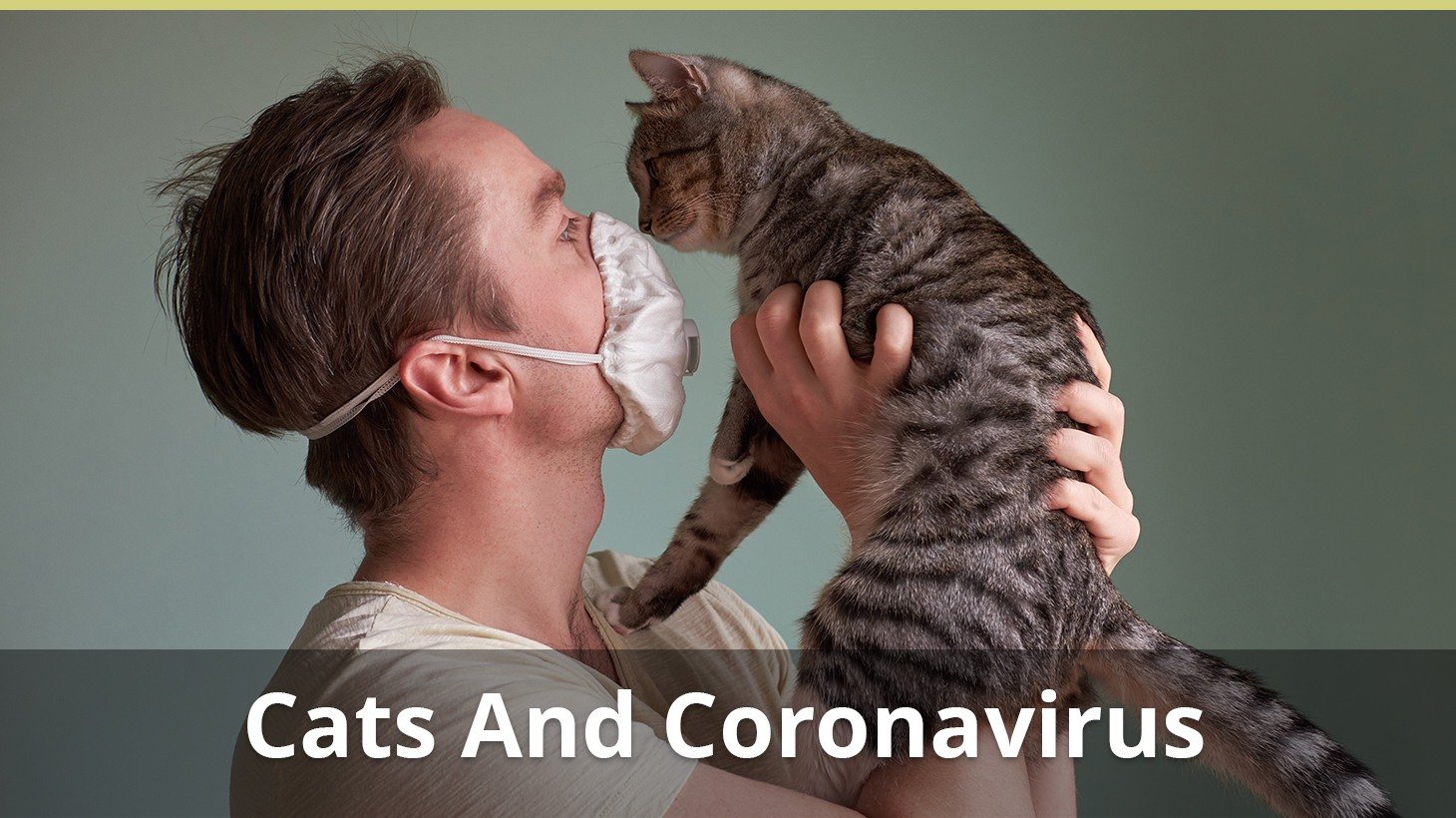COVID-19, a coronavirus, has created a worldwide pandemic in 2020, causing concern, questions, and fear.
It’s only natural that, as you get the feather wand out to enjoy some quality time with your cat, your mind might start to wonder… “Can my cat contract coronavirus?” “Can my cat give ME coronavirus?” “Should I be worried?”
Wonder no longer. Here are the answers.
Can Cats Contract COVID-19?
The answer is no. Cats cannot contract COVID-19.
Cats can contract coronavirus, but NOT the COVID-19 strain.
According to the American Veterinary Medical Association (AVMA), the CDC, infectious disease experts, and multiple human and animal health organizations, NO evidence supports pets becoming ill with COVID-19 or transmitting the virus to humans or other animals.
What Should I Do With My Cat If I Become Sick With COVID-19?
Even though cats reportedly do not become ill with COVID-19, the AVMA recommends you limit contact with your cat.
Try to choose another member of the household to take care of feeding, litter box cleaning, and playtime. If you must take care of your cat, wear a facemask during these activities.
If you test positive for COVID-19, refrain from doing any of the following with your cat:
- Sharing food
- Kissing
- Hugging
- Sharing dishes, glasses, cups or utensils
- Sharing towels or bedding
Also, make sure that you wash your hands for at least 20 seconds before and after any contact with your cat.
Are There Tests for COVID-19 in Cats?
Yes, a test for COVID-19 became available through IDEXX Laboratories on March 13, 2020. Even though there is a test available, the CDC, AVMA, and IDEXX are not recommending testing of pets at this time.
IDEXX has reported that thousands of samples from dogs and cats having been collected and tested. The results show no positive cases. The findings align with the current expert understanding that COVID-19’s primary means of transmission is human to human.
What About My Cat’s Fur? Can It Carry COVID-19?
It is very unlikely to contract COVID-19 by petting or playing with your cat. A strand of cat fur is porous and fibrous; therefore, the virus cannot attach itself to the coat allowing for transmission.
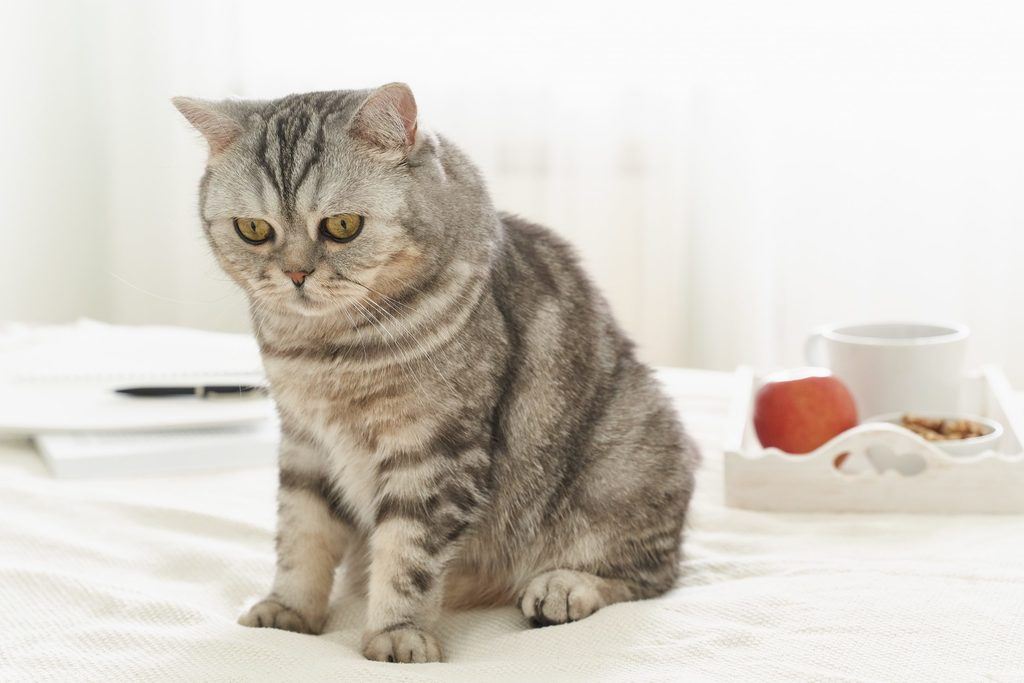
What If My Cat Gets Sick During This Pandemic?
If you notice that your cat is not feeling well, contact your veterinarian and discuss the need for an appointment. You may also contact a telemedicine veterinarian to discuss your pet’s symptoms.
If you do make an appointment, follow all new hospital guidance and protocols to keep social distance to protect yourself, veterinarians, and veterinary staff.
If you are sick with COVID-19 or ordered to self-isolate due to symptoms or exposure, DO NOT take your pet to the vet. Have a family member, friend, or representative take your cat to the veterinary hospital. Ensure that they also follow the social distancing protocols.
How Else Do I Keep My Cat Safe During This Pandemic?
The AVMA recommends all pet owners be ready for an emergency.
Ensure that you have an emergency kit with at least two weeks’ worth of your cat’s food and any needed medication. These emergency kits will be useful in the case of quarantine or self-isolation if you have exposure or contract COVID-19.
What About the Two Dogs In Hong Kong Testing Positive?
The testing performed with the two dogs in Hong Kong did not distinguish between an intact virus or fragments of the virus.
Why is that important? An intact virus detection would mean there was an actual infection. With a fragment, there isn’t.
Many medical experts doubt whether the two dogs ever had an actual infection. The first dog that tested positive for COVID-19 tested NEGATIVE for antibodies to the virus. The negative antibodies indicate that an infection was never present as the body’s white blood cells did not mount a response.
The first dog that tested positive for COVID-19 in Hong Kong did recently pass away after being released from quarantine. Before being released, this dog tested negative for the virus. The most likely causes of death were not from COVID-19, but due to age (17 years) and multiple underlying illnesses.
Neither the dogs nor housemates ever showed signs of the COVID-19 infection.
Should these two cases be cause for worry?
Currently, there are over 335,000 known cases of positive human COVID-19, and those numbers increase daily. To date, there have only been two dogs that have tested positive for evidence of the virus or fragments in the bloodstream.
With the exponential increase of COVID-19 in the human population, there should be higher positive cases if the virus infected dogs and cats.
At this time, the World Health Organization is monitoring continued research about COVID-19 and pets.
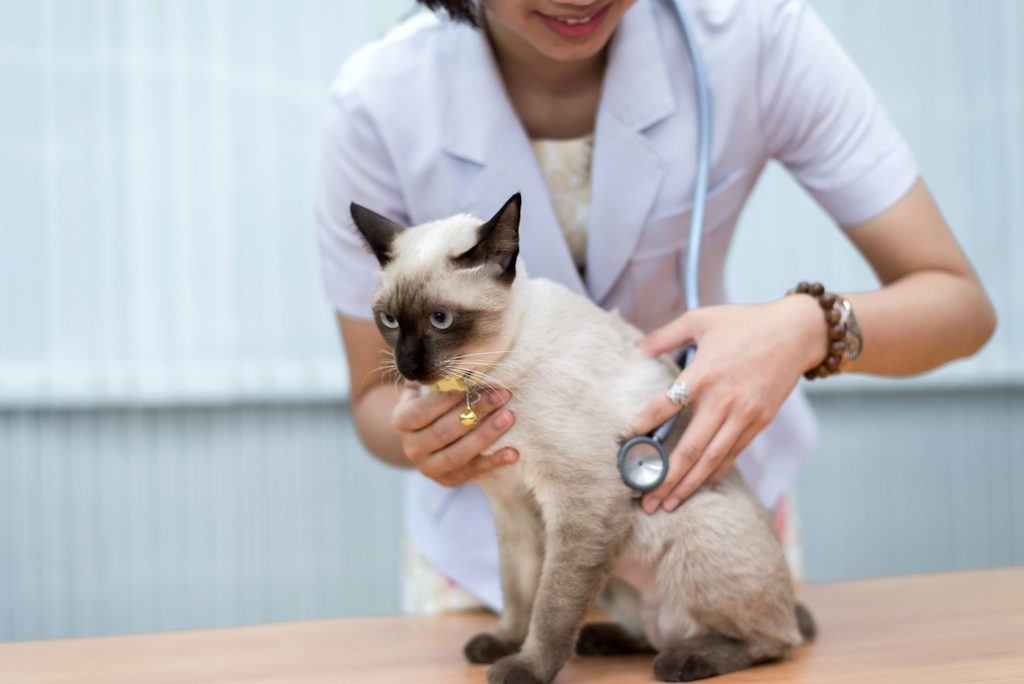
Is There A Coronavirus That Cats Can Contract?
While cats do not contract COVID-19, they can contract feline enteric coronavirus (FECV). FECV is similar to COVID-19 in that it is a single-stranded RNA virus that has a high prevalence in domestic cat populations worldwide, with no discrimination of breed.
Transmission of FECV occurs with ingestion or inhalation of infected feces. Specific ways that cats can come in contact with infected feces include:
- Contaminated litter boxes
- Cat grooming another cat with infected feces on the fur
- Housing items – such as kennels, bedding, scratching posts, etc.
- Human petting with virus contamination on the skin
FECV is a widespread virus that many cats contract during their lifetime; infection rates are at 90% of cats housed in catteries and up to 50% of cats in single-cat households.
Cats tend to have infections that occur when they are under 16 weeks of age. FECV infections are generally asymptomatic, but mild diarrhea can occur.
Is There a Way To Prevent Feline Coronavirus?
You can decrease the risk of spread by making the following changes.
- Clean your litter boxes daily. And make sure you have an adequate number of litter boxes in your home. A good rule of thumb is to have one more litter pan than the number of cats.
- Don’t place litter boxes near food or water dishes. Litter boxes placed near plates will lead to fecal particles landing on the rims of the bowl, food, and water, allowing the increased chance of fecal-oral transmission of the virus.
- Reduce your cat’s stress. As in humans, stress reduction is beneficial in strengthening the immune system to prevent infection. Ensure that your cats have enrichment toys, scratching posts, and areas to hide.
- Get regular veterinarian checkups. Your cats should see their veterinarian regularly to make sure they are current on recommended vaccines to prevent stress from an underlying illness.
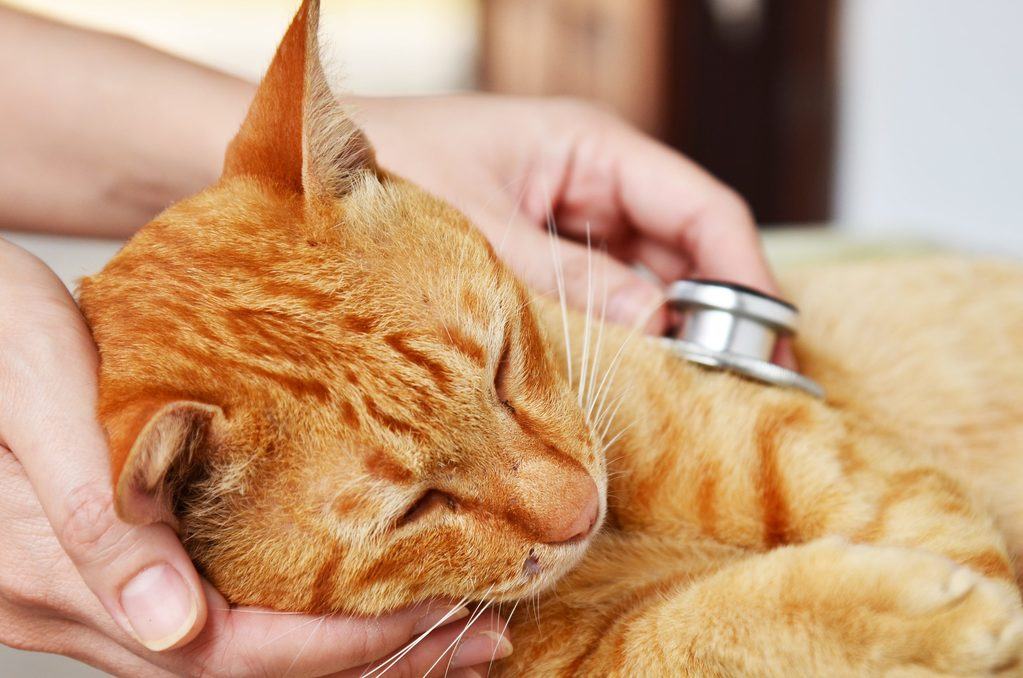
Is Feline Coronavirus Deadly Like COVID-19?
Death due to FECV is very uncommon. Unfortunately, FECV can trigger an immune-mediated response called Feline Infectious Peritonitis (FIP), which is fatal.
Approximately 5% of cats infected with FECV will develop FIP. FIP usually develops in cats between 3 months and two years of age, but any age can develop this response.
FIP can have two different variations called the dry form and wet form.
The dry form will cause inflammatory lesions through the body but most specifically affect the central nervous system, eyes, lungs, liver, kidneys, and pancreas.
The wet form will cause inflammation of blood vessels resulting in fluid leaking into secondary spaces, including the abdomen, thorax, heart, and scrotum.
What are the Symptoms of FIP?
Clinical signs of FIP owners will typically notice at home include:
- loss of appetite
- weight loss
- lethargy
- fluctuating fever that is not responsive to antibiotics.
Are Specific Breeds More Likely to Get FIP?
Yes, certain breeds are more susceptible to developing FIP. These include:
- Abyssinian
- Bengal
- Birman
- Himalayan
- Ragdoll
- Devon Rex
What Do I Do If My Cat Has FIP Symptoms?
If you notice any of these symptoms of FIP, contact your veterinarian immediately to be evaluated. The diagnosis of FIP is confusing and frustrating as many of the clinical signs are vague and can occur with other diseases found in cats.
At this time, FIP is fatal in almost all cases. Supportive care can temporarily reduce symptoms and improve the quality of life for your cat.
This care includes anti-inflammatory drugs, immunosuppressive drugs, fluid support, and pain control. Sadly once FIP is diagnosed, humane euthanasia may be the right course of action.
Thankfully there are experimental drugs on the horizon that are showing high success rates with treating FIP.
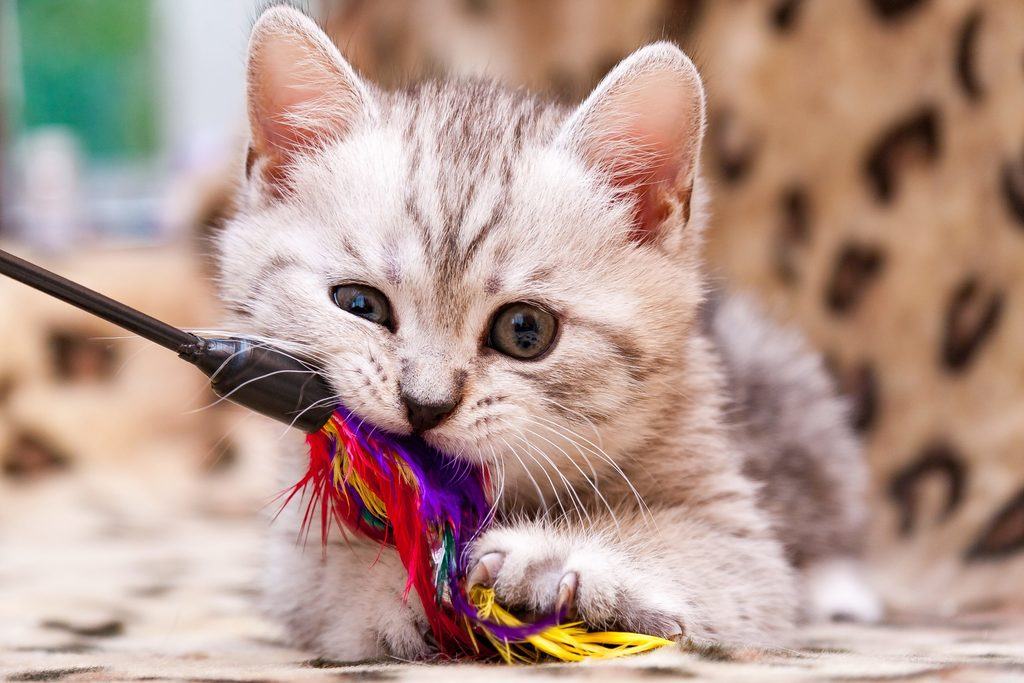
In Conclusion
During this time of worldwide pandemic with COVID-19, you can rest assured that your cat will neither contract nor transmit the disease to you or your family.
Still, ensure that you take proper precautions to keep your family and pets safe. Make sure to continue to follow the AVMA and CDC guidelines for updates on pet’s role in COVID-19.
While we spend more time at home, enjoy it with your cats. Occupy your time with your cats in active play and allow lap sessions of purring and love (sometimes drooling as well).
If you have any concerns about your cat’s health, contact your local veterinarian or use telemedicine services.
So go ahead, continue to play with your cat, and the feather wand!

